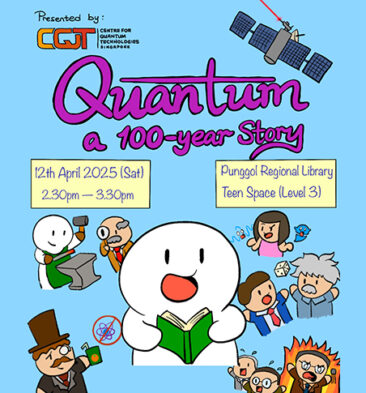We are Singapore’s Centre for Quantum Technologies
Advancing the frontiers of quantum science and engineering
Highlights
CQT by numbers
Events
Join us at our upcoming talks, workshops and conferences.

CQT Outreach Event
Quantum: A 100-Year Story
Date/Time: 12-Apr - 12-Apr, 2:30pm
Speaker: Alexander Hue
Venue: Punggol Regional Library - Teenspace (Level 3)

Lunch Seminar
Bandits roaming Hilbert space
Date/Time: 28-Apr - 28-Apr, 12:30pm
Speaker: Josep Lumbreras Zarapico
Venue: CQT Level 3 Seminar Room, S15-03-15

CQT Workshop
QCamp 2025
Date/Time: 9-Jun - 13-Jun, 12:00am
Venue: CQT Level 3 Seminar Room S15-03-15
Abstract:QCamp is a one-week summer school for curious and inquisitive minds who wish to explore and understand the physical laws that govern the world's smallest scales: quantum physics. The scope of QCamp is to provide vivid demonstrations of these laws, offer career advice, as well as to help students build a technical foundation for independent exploration of this world. QCamp is organised by the Centre for Quantum Technologies (CQT) at the National University of Singapore.

CQT Workshop
Flash QCamp 2025
Date/Time: 18-Jun - 18-Jun, 12:00am
Venue: S14-0619

